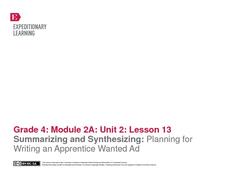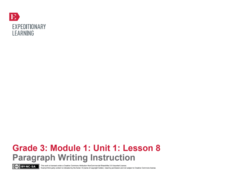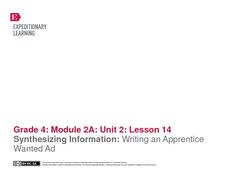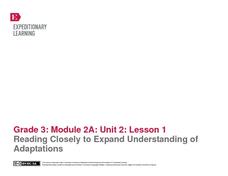Curated OER
Author's Opinion
Fifth graders read a text about Amelia Earhart's father and use facts from the text to identify the author's opinion. In this author's opinion lesson plan, 5th graders complete a worksheet that is provided.
Curated OER
World Tourism Day
In this World Tourism Day activity, students complete activities such as read the passage, match the phrases, fill in the blanks, choose the correct word, multiple choice fill in, correct the spelling, put text in correct order,...
Curated OER
Disabilities Day
In this Disabilities Day worksheet, students complete activities such as read the passage, match the phrases, fill in the blanks, choose the correct word, multiple choice fill in, correct the spelling, put text in correct order,...
Curated OER
Author's Voice in Passage
Learners explore author's voice. In this literary elements and reading comprehension lesson, students listen to two poems about snakes (included) and identify adjectives and other descriptive words and phrases that help them determine...
Curated OER
Plant Nutrition
The first slide displays the human nutrition pyramid, unrelated to the rest of the collection. Plant nutrients and fertilizers are really the focus. Different nutrients required by plants are listed and the roles that they play in plant...
Curated OER
Categorizing Texts According To Author's Purpose
Young scholars categorize books into the 3 different kinds of author's purpose. In this author's purpose lesson plan, students categorize them into the categories of entertain, inform, and persuade.
Curated OER
Guided Reading Organizer for Chain Reaction
The class uses Chain Reaction, a magazine, to build a better understanding of Latin and Greek roots found in scientific vocabulary. They use two attached worksheets to help them read a scientific article, using visual clues and their...
Curated OER
Monster: Compare and Contrast
Helpful for a unit on Walter Dean Myers' Monster, or any novel that you are teaching, a graphic organizer prompts learners to compare and contrast different character traits. The first box has one set of lines to jot down what two...
Curated OER
The Boy in the Striped Pajamas: Graphic Organizer: Venn Diagram
Compare and contrast the characters in John Boyne's The Boy in the Striped Pajamas. Using a Venn diagram, kids write in different traits to describe each person, and note their shared characteristics in the middle section.
Achievement Strategies
Fishbone Map for Cause and Effect
Class members can outline a topic or text with this graphic organizer. There are spaces provided for causes, details, and results.
Curated OER
Writer's Craft: Foreshadowing
Track instances of foreshadowing in any text with a straightforward graphic organizer. In one column, learners note down the events that happened, and in the other they list the clues that indicated that those events would happen. Some...
Pearson
Practice Test English Language Arts: Grade 7
Practice makes perfect. A practice test designed for the ELA MCAS Assessment gives seventh grade learners the opportunity to answer reading comprehension questions and respond to essay prompts. Questions involve general fiction and...
Curated OER
Hands-On Outlining
In order to write an effective outline, children must be able to identify main ideas and supporting details, which is the aim of this fun and kinesthetic activity. The class works on the floor to organize sentence strips prepared by the...
Middle School Computer Projects
Timeline of Your Life
Pupils can use PowerPoint as a tool to create clear timelines that show their lives in relationship to historical events. Take a trip to the computer lab and share this page with your class. Class members can watch each video and follow...
Curated OER
The Periodic Table Game
First, beginning chemists assemble a large periodic table of elements. Then, they play a game in which they roll dice, move a marker along the elements, and collect pennies according to the number of valence electrons of the element that...
Polk Bros Foundation
Picture the Main Idea
Invite your learners to represent the central idea of a text visually. Individuals note down the main idea and then have the opportunity to draw four pictures that show the idea. Consider working out the main idea together and then...
EngageNY
Summarizing and Synthesizing: Planning for Writing an Apprentice Wanted Ad
In instructional activity 13 of this unit on colonial trade, young researchers learn about apprentices as they prepare to write help-wanted ads for the specific trade they have been researching. To begin, the class listens closely as the...
EngageNY
Mid-Unit 2 Assessment: On-Demand Informational Writing
Lesson 7 focuses on building academic vocabulary and writing an explanatory letter with supported textual evidence. For the first five minutes of the instructional activity, the educator reminds the class of how to read and refer to the...
EngageNY
Paragraph Writing Instruction
Writing a paragraph from details found directly in a text is the central focus of this thorough and explicit lesson plan. Using the stories Nasreen's Secret School and Rain School, third graders are lead step-by-step...
EngageNY
Synthesizing Information: Writing an Apprentice Wanted Ad
Fourth graders view examples of help-wanted ads as they plan and create their own writing in the fourteenth instructional activity of this unit on colonial trade. The engagement of the class is captured when the teacher shares an actual...
EngageNY
Reading Closely to Expand Understanding of Adaptations
Third graders work to determine the main idea, recall key details, and answer questions using an informational text on the topic of animal adaptations. Using the non-fiction text "Staying Alive: Animal Adaptations" (provided) the teacher...
MOST
What Are Cells?
What's in a cell, anyway? Kids read informational text on what makes up both animal and plant cells, including a page of vocabulary terms they will need to be familiar with (cytoplasm, ribosomes, vacuoles, etc.). Full-color images...
Curated OER
Marking Time
Two narrative excerpts tell the same story from different points of view. In the first excerpt (first person), sequencing words and phrases are bolded and learners write down what the bold type does. The second excerpt is in third...
EngageNY
Mid-Unit 2 Assessment: Inferring About the Silversmith Trade in Colonial Times
The seventh lesson plan in this unit on colonial trade assesses fourth graders' ability to use details from an informational text to make inferences and create a piece of informative writing. The included assessment begins with learners...
Other popular searches
- Organizing Text
- Identify Text Organization
- Text Organization Patterns
- Organizing Text Information
- Types of Text Organization
- Text Organizational Patterns
- Reading Text Organization
- Organizing Text Sequence
- Author Text Organization
- Types Text Organization
- Science Text Organization
- Ways of Organizing Text























